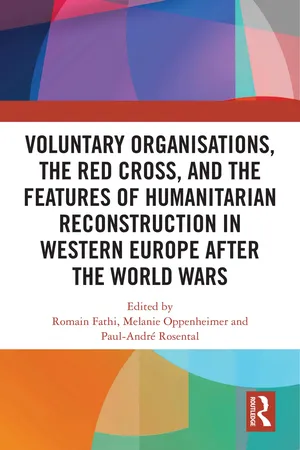
Voluntary Organisations, the Red Cross, and the Features of Humanitarian Reconstruction in Western Europe after the World Wars
- English
- ePUB (mobile friendly)
- Available on iOS & Android
Voluntary Organisations, the Red Cross, and the Features of Humanitarian Reconstruction in Western Europe after the World Wars
About this book
This book explores the ways in which non-government organisations have contributed to the reconstruction of, and care for populations in, Western European countries including but not limited to Belgium, France, Germany, Italy and the United Kingdom in the aftermath of the World Wars.
Historical research on voluntary or non-government organisations and their contribution to the reconstruction of states, communities and humanitarian assistance to civilian populations following conflicts, epidemics and disasters through the twentieth century has generally focused on non-Western European countries, except for Second World War II. The historiography suggests that it is mostly in Eastern Europe, the Middle East, Asia and Africa that natural or man-made disasters have occurred and that these places have been the focus for humanitarian assistance. Rather, the humanitarian enterprise is viewed through the binary of the Global North/Global South, those who save and those who are saved. The chapters in this volume investigate how the Red Cross movement – the League of Red Cross Societies, the International Committee of Red Cross and individual national societies – and other voluntary organisations such as the Rockefeller Foundation and a range of other international and local non-government bodies have contributed to reconstruction in these countries at both national and local levels following times of crises such as wars, civilian upheavals and disasters.
This book will appeal to scholars and students of history, humanitarian studies, international relations and social sciences. The chapters in this book were originally published as special issues in European Review of History – Revue européenne d'histoire.
Frequently asked questions
- Essential is ideal for learners and professionals who enjoy exploring a wide range of subjects. Access the Essential Library with 800,000+ trusted titles and best-sellers across business, personal growth, and the humanities. Includes unlimited reading time and Standard Read Aloud voice.
- Complete: Perfect for advanced learners and researchers needing full, unrestricted access. Unlock 1.4M+ books across hundreds of subjects, including academic and specialized titles. The Complete Plan also includes advanced features like Premium Read Aloud and Research Assistant.
Please note we cannot support devices running on iOS 13 and Android 7 or earlier. Learn more about using the app.
Information
Table of contents
- Cover
- Half Title
- Title Page
- Copyright Page
- Table of Contents
- Citation Information
- Notes on Contributors
- 1 Voluntary organizations, the Red Cross and the features of humanitarian reconstruction in Western Europe after the World Wars
- 2 The activity and influence of the American Red Cross in Italy during and after World War one (1917–1919)
- 3 At (Red) cross purposes: American Red Cross humanitarian ‘arrogance’ and France’s Great War relief and reconstruction, 1917–20
- 4 Œuvres de guerre, Croix-Rouge américaine et reconstruction pendant et après la Première Guerre mondiale: l’exemple du Havre en Seine-inférieure
- 5 International development contested: the American Child Health Section in Belgium (1922–1924)
- 6 Despondence, dependence and dignity: on the dilemmas of being an object of international charity in Western Europe – a Weimar German case study
- 7 Voluntary organizations and the provision of health services in England and France, 1917–29
- 8 The Shôken Fund and the evolution of the Red Cross movement
- 9 Calculating war, calculating peace: the Rockefeller Foundation and science research in Britain
- 10 Paving the road to reconciliation: the training and practice of the Friends Relief Service in post-war reconciliation, 1943 to 1947
- 11 Women in child search: a gendered view of post-World War II reconstruction
- 12 The road to recovery: the provision of health services to French, German and Italian children in the aftermath of the Second World War (1944–49)
- Index